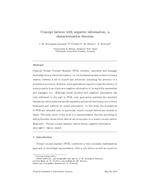Concept lattices with negative information: A characterization theorem
Aus International Center for Computational Logic
Concept lattices with negative information: A characterization theorem
José Manuel Rodríguez-JiménezJosé Manuel Rodríguez-Jiménez, Pablo CorderoPablo Cordero, Manuel EncisoManuel Enciso, Sebastian RudolphSebastian Rudolph
José Manuel Rodríguez-Jiménez, Pablo Cordero, Manuel Enciso, Sebastian Rudolph
Concept lattices with negative information: A characterization theorem
Information Sciences, Volume 369:51–62, November 2016
Concept lattices with negative information: A characterization theorem
Information Sciences, Volume 369:51–62, November 2016
- KurzfassungAbstract
Classical Formal Concept Analysis (FCA) extracts, represents and manages knowledge from positive information, i.e., its fundamental data model is a binary relation between a set of objects and attributes indicating the presence of a property in an object. However, some applications require to treat the absence of some property in an object as a negative information to be explicitly represented and managed, too. Although mixed (positive and negative) information has been addressed in the past in FCA, such approaches maintain the standard framework, which hides the specific semantics and avoids the further use of direct techniques and methods for mixed information. In this work, the foundations of FCA are extended and, in particular, mixed concept lattices are studied in depth. The main result of this work is a characterization theorem specifying in lattice-theoretic terms which lattices are isomorphic to a mixed concept lattice. - Forschungsgruppe:Research Group: Computational LogicComputational Logic
@article{RCER2016,
author = {Jos{\'{e}} Manuel Rodr{\'{\i}}guez-Jim{\'{e}}nez and Pablo Cordero
and Manuel Enciso and Sebastian Rudolph},
title = {Concept lattices with negative information: A characterization
theorem},
journal = {Information Sciences},
volume = {Volume 369},
year = {2016},
month = {November},
pages = {51{\textendash}62},
doi = {10.1016/j.ins.2016.06.015}
}
